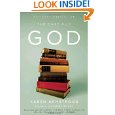 In my last two posts, I summarized both Karen Armstrong’s views of religion and God and her negative view of Christian doctrines.
In my last two posts, I summarized both Karen Armstrong’s views of religion and God and her negative view of Christian doctrines.
Karen Armstrong is a fantastic writer that holds one’s interest while spinning out tales that seamlessly mix religion, history, science, and philosophy. She is, beyond doubt, far more educated than me on these subjects. Yet when Armstrong hit upon a subject that I knew even a little bit about, I would immediately recognize that she was often misunderstanding, misrepresenting, or misquoting her sources. This fact caused me to lose confidence that she was accurately representing her other sources.
In this post I will concentrate on the frequent misinterpretations of her religious sources. Continue reading
